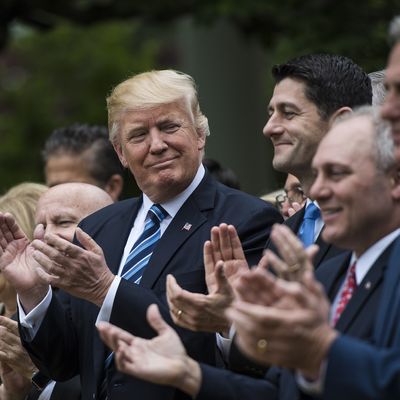
On the campaign trail, President Trump promised to immediately repeal Obamacare and replace it with “such great health care, at a tiny fraction of the cost.” “It’s going to be so easy,” he told his supporters.
Once in office, Trump told congressional Republicans to figure out how to make seven years of contradictory GOP health-care promises a reality. The White House did little to steer the process, and Trump actually undermined their efforts at points, calling the version of the health bill that actually made it out of the House “mean.” When Minority Leader Mitch McConnell’s convoluted effort to ram “skinny repeal” through the Senate flopped, Trump publicly lashed out at McConnell and other Republicans who failed him.
It seems the lesson here is that Trump needs to learn more about the boring and difficult task of legislating, and closely coordinate with congressional Republicans on how to enact their agenda. In a predictable but still insane development, it appears Trump has decided to do the opposite: Let congressional Republicans figure out how to enact his legislative goals, while distancing himself from those lawmakers in case their efforts don’t work.
The next item on the GOP agenda is overhauling the tax code while simultaneously passing a budget and raising the debt ceiling. Last month, President Trump made a familiar prediction: “I think after health care, taxes are gonna be so easy.”
Last spring, then–White House press secretary Sean Spicer said the Trump administration would play a leading role in crafting the tax legislation. “Obviously, we’re driving the train on this … [but] we’re going to work with Congress,” he said. After months of toil, Treasury Secretary Steve Mnuchin and National Economic Council director Gary Cohn proudly unveiled the Trump tax-reform plan: a bullet-point list of highly regressive tax cuts that was actually less detailed than the proposal put out by Trump campaign.
Mnuchin and Cohn weren’t done yet. They continued working with members of Congress, and in July they released a five-paragraph statement outlining the tax legislation. This week Politico reported, “Trump’s top aides and congressional leaders have made significant strides in shaping a tax overhaul.” Mnuchin told ABC News the plan was to have “a full-blown release of the plan” in September.
But on Thursday, Bloomberg reported that working out the details of that plan actually won’t involve the White House:
The president was not expected to set forth his own plan or many specifics, the official said. Instead, Trump would advocate broad themes of middle-class tax cuts, simplifying the tax code and making businesses more competitive in a way that encourages job creation, the official said.
Republican congressional leaders have already said they don’t expect to release a joint tax plan with the White House. Instead, they’ll rely on House and Senate tax-writing committees to solve the big questions that remain unanswered, according to two people familiar with the matter.
Trump’s role will merely be to rally public support for whatever legislation Congress comes up with.
But meanwhile, the Washington Post reports that the president is “strategically separating” himself from Republicans in Congress, as evidenced by Thursday’s Twitter attack on “Mitch M & Paul R”:
Trump is railing against Republicans because he thinks it will help him politically down the road, for instance during a 2020 reelection bid, said one outside adviser to the White House.
If Republicans lose the House in the 2018 midterm elections, as several White House advisers have warned the president, Trump can say, “See, I told you these guys wouldn’t get anything done. I’ve been saying this for months. They’re not following my agenda,” said the adviser, who spoke on the condition of anonymity to describe private talks.
So the idea is that Trump will make little effort to get his agenda passed, then tell his base to blame Republican elites for failing him. “It’s almost like he’s giving up already,” a former Senate GOP leadership aide told The Hill.
If Trump just wants to shift the blame for failing to enact health care and tax reform, this could work, since he has much higher support among the GOP base than the Republican leadership. Of course, it’s also absurd, since a Democratic Congress would prevent Trump from passing any items on his agenda through 2020 (if they don’t impeach him).
It’s no surprise that Trump would put maintaining his popularity above enacting his frequently shifting policy goals. But will the base still love him if he keeps talking about making America great again, yet never actually gets anything done?






























